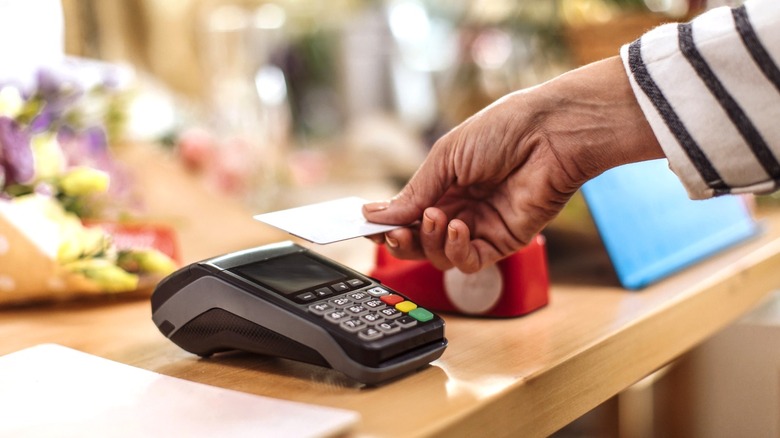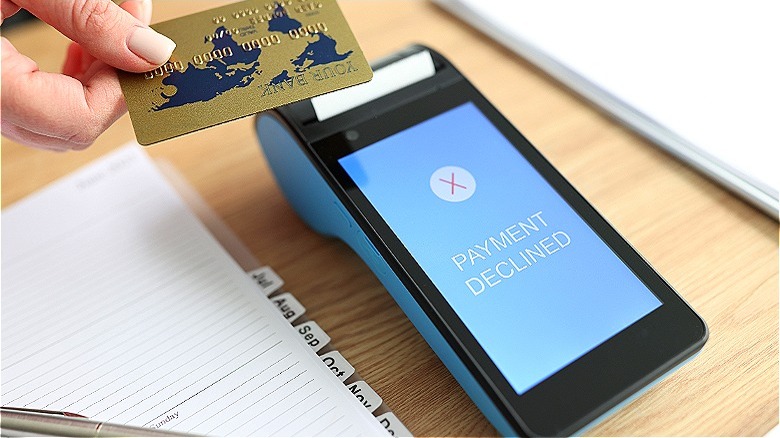What You Might Not Know About Pending Credit Card Transactions
It's happened to everyone at some point: You log on to your credit card app only to find a bunch of payments still sitting in a pending section. Sometimes these pending charges can be for purchases you made days ago, and sometimes you might have already assumed they were calculated into your previous expenses. This delay in a payment hitting your account can throw off your budgeting plan or even cause you to accidentally overspend and exceed your credit limit. Though pending charges aren't a new part of banking, they can be one of the most confusing elements. If you are wondering why some payments get classified as pending or if you've ever questioned why some charges sit as pending transactions for as long as they do, you've come to the right place.
The basics behind pending transactions are that the bank of the merchant you purchased from must check with your card issuer to ensure you actually have the necessary funds. With credit cards, the total for the charge is generally deducted from your available credit line even if it has not been paid to the merchant yet. While this can become a charge for that exact amount, other transaction types (like ones typically seen at hotels called incidentals or even restaurant bills) might not go through at the pending amount listed, or go through at all. In this way, pending transactions can serve as a kind of insurance for merchants who want a guarantee they will be able to charge you should the need arise.
Reasons for pending transactions
There are two main reasons for pending credit card transactions. The first is simply the differing processing time between both involved parties in a transaction (i.e., the merchant and the credit card issuer). The other has to do with credit card holds used by certain merchants. Holds essentially make sure that your card has a certain amount available. Think of them as a pre-authorization. Generally speaking, a pending charge will process within three to five business days (weekends could extend this). However, certain transaction types, such as holds, and specific merchant types can show as pending for longer.
Examples of transaction and merchant types that can take longer include hotels, where a pending hold might show on your account for the duration of your stay. These holds, usually for incidentals, don't factor in how much you might spend on extra hotel amenities like room service, parking, or a spa treatment. Only when you check out of the hotel and receive a final bill can a total actually be charged to your card.
Plus, the card you put on file with a hotel at check-in might not necessarily be the one you end up using to pay for the bill at check-out. In these cases, the initial credit card you used at check-in for the incidentals could have a pending hold for a while. Other examples of pending charges that may take longer include car rentals, which similarly use incidental holds in cases of damage, as well as restaurants, depending on how they handle tip reporting on transactions.
How pending transactions affect you
One of the biggest issues with pending credit card transactions, especially those that might show up for an extended amount of time, is that they can tie up part of your credit line. Since, essentially, the money is pre-authorized or spoken for (even though it hasn't technically been spent yet), this holds up money you might need for other things. If you have a low credit limit or you're operating close to your limit, pending transactions and holds can ultimately hamper your ability to use that card until the pending transactions are processed or removed. Keep in mind that your card issuer can choose to decline any incoming purchases that might exceed your current credit limit so make sure to double- check your card user agreement to fully understand how your card issuer handles these instances.
Another common issue is that, while a transaction sits pending on your account, your credit card issuer can't actually help you with any problems you might have with the would-be charge. Until a transaction is processed, most card issuers will point customers directly to the actual merchant who put through the transaction to try and troubleshoot any potential issues with a pending charge. To make matters even more complicated, if you should ever need a pending charge canceled, it requires quite a bit of leg work. First, you'd need to reach out to the merchant who would then subsequently need to reach out to your card issuer in order to get the pending transaction completely canceled.


